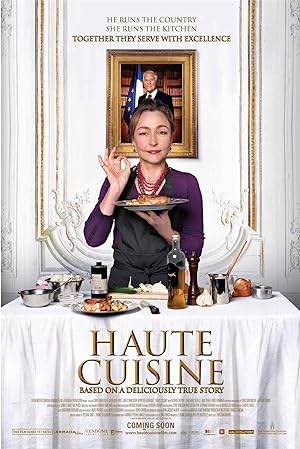I loved Haute Cuisine. Do not let the subtitles dissuade you from watching this understated French film. Haute Cuisine is a masterful biography of Daniele Delpeuch, the former private chef for Francois Mitterand when he was President of France. Haute Cuisine begins at the end of her latest adventure, as a chef for and only woman in an Antarctic research station, and intersperses flashbacks of her tenure at the presidential palace.
First, I love food and films that depict the excitement of food made well that tastes amazing. It is already challenging for painters and filmmakers to depict a three dimensional world on a two dimensional plane, but even filmmakers cannot bridge the gap between the olfactory and savory senses by using a visual medium; yet Haute Cuisine succeeds at this task.
Second, I love stories of women navigating a predominantly male dominated, heavily bureaucratic workplace. In Haute Cuisine, women do not belong in the kitchen if the kitchen is in the Elysee Palace. Is she resented for being a woman or because the personal chef takes away some of the attention away from the main kitchen, which is dominated by a territorial chef? Their styles are completely different. He wears the traditional chef white uniform whereas she is dressed sensibly and professionally. His kitchen is regimented and hierarchical whereas her kitchen is experimental like a home kitchen, but elevated to an art with a anthropological and historical intention. When she tries to adhere to the professional lunch, she quickly abandons it because it is nothing more than another opportunity for the chef to disrespect her. The chef is competitive with her whereas she only thinks of providing the best meal for those they cook for. They do not even agree on the definition of acceptable and high quality ingredients. Even though the job is nothing but a battle, our heroine maintains her personal commitment to excellence and identity.
Third, I love stories about improbable, but brief, unlikely friendships that develop on common ground, in this case food. Even though she is the President’s employee, there is a type of friendship that burgeons as she engages him as a human being with a childhood, preferences and needs in order to adjust her menu to suit his tastes. He relates his memories of simpler times and is a human being who just wants comfort food, not a titan. With all the kitchen protocol and regiment of life at the palace, his humanity is lost. The personal chef breathes life and warmth into an impersonal, functional place. She brings quality of life to the aging leader and is everything that the formal kitchen is not, a type of doctor to the soul, a mother figure.
Fourth, other viewers complain that the parallel establishing storyline at Antarctica is not as interesting, but I could not disagree more. The locations may shift, but the character is a strong, fully formed woman who knows what she wants and achieves it or leaves. She is not ambitious in terms of employment, but in terms of daily bread, and if someone prevents her from delivering daily, then she will just move on to a place where she can. Haute Cuisine challenges our preconceived notions of success, dismisses the cheapness of fame and titles and encourages us to create and adhere to our own hallmarks.
Stay In The Know
Join my mailing list to get updates about recent reviews, upcoming speaking engagements, and film news.





